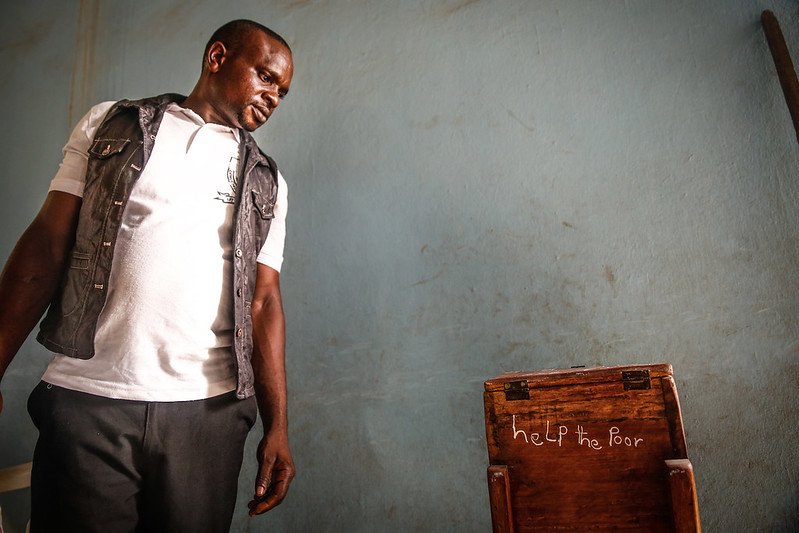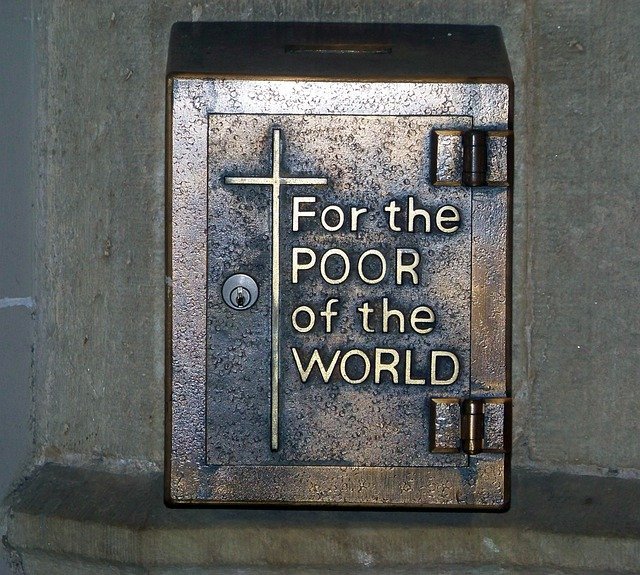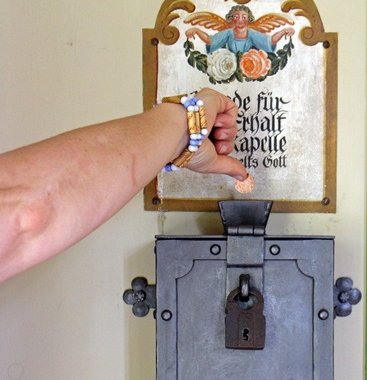The Apostle James claims that “Religion that God our Father accepts as pure and faultless is this: to look after orphans and widows in their distress and to keep oneself from being polluted by the world” (James 1:27).
During the time of the New Testament, there were no social programs designed to help the less fortunate. The government did not offer any kind of financial assistance to the poor or destitute. However, the Bible instructs the followers of God to fulfill the second greatest commandment of loving others as yourself by providing for those who cannot care for themselves.
Proverbs 14:31 says, “Whoever oppresses the poor shows contempt for their Maker, but whoever is kind to the needy honors God.” Also, farmers were encouraged to leave the outer rows of their crops for the poor to gather food, or to allow them to come behind the harvesters to pick up any grain or fruit that may have been overlooked or fallen on the ground. For example, Leviticus 23:22 states, “When you reap the harvest of your land, do not reap to the very edges of your field or gather the gleanings of your harvest. Leave them for the poor and for the foreigner residing among you. I am the Lord your God.” (See also, Leviticus 19:10).
Not too long ago, I was given an opportunity to apply this principle in giving to the poor. I was in the drive-thru lane at Chick-fil-A about to order my lunch when I saw a man sitting on the curb at the gas station next door. He only had one arm and his clothes were tattered and dirty. A small duffle bag sat at his feet. I assumed he was homeless. So, I decided to get a gift card from Chick-fil-A along with my lunch so that I could give it to this poor man, allowing him to order a hot meal. I even thought about saying the signature Chick-fil-A slogan of “My pleasure!” when the man thanked me for this blessing. However, by the time I made it around the restaurant drive thru and purchased the gift card, the man was gone.
Now, there are some people who will make a similar gesture of helping the poor instead of giving money to a church. They will deduct from their “tithe” and instead give that money to a charity to help the poor. However, is this practice biblically correct? Let’s find out.
Should Tithes Be Given to the Church or the Poor?

If we are going to answer that question accurately, then we will need to discover what the Bible says about tithing and how it is supposed to be given and used.
So, What does the Bible say about tithing? Do you have to give your tithe to the church, or can the money be donated to another charity? According to the Bible, what should your tithe money or offering be used for?
First, tithing or giving financially to the church is a command from God. According to Malachi 3, we are robbing God when we fail to give the whole tithe to the church (see Malachi 3:8-10). According to Leviticus 27:30, “A tithe of everything from the land, whether grain from the soil or fruit from the trees, belongs to the Lord; it is holy to the Lord.”
There are several passages that indicate that this tithe was to be ten percent of a person’s income or ten percent of their crop or their livestock (for example, see Leviticus 27:32, Numbers 18:26, Deuteronomy 14:22, and Nehemiah 10:38). However, there were other gifts, contributions, and offerings that the people gave in addition to these tithes which were often used to meet a specific need (see Deuteronomy 12:6-17 and 2 Chronicles 31:12).
The Purpose of Tithes and Offerings According to the Bible
There is one particular passage that seems to succinctly clarify the purpose of these various tithes and offerings. Deuteronomy 14:22-29 indicates that the tithe is ten percent of a person’s annual income, and this tithe was to be used for the purpose of worshiping God.
However, there was also a provision that a portion of the tithe was to be used for the purpose of maintaining the operations of the temple and for providing for the poor. In addition, there were occasions when the people were encouraged to give above their tithe to help with the construction and maintenance of the temple or to help meet some financial need (see 1 Chronicles 29:1-9 for one example).
Do we have a Moral Obligation to Care for the Needy? Then, Can we redirect our Church Tithe to the Poor?

Leviticus 25:35-38 indicates that we do have a moral obligation to care for the poor and to provide for their needs:
“If any of your fellow Israelites become poor and are unable to support themselves among you, help them as you would a foreigner and stranger, so they can continue to live among you. Do not take interest or any profit from them, but fear your God, so that they may continue to live among you. You must not lend them money at interest or sell them food at a profit. I am the Lord your God, who brought you out of Egypt to give you the land of Canaan and to be your God.”
However, this passage says nothing about a tithe or transferring what would have been an offering and in turn giving it to the poor; but rather, we are instructed to not exacerbate someone’s debt by imposing high interest rates or exorbitant prices upon the poor. Unfortunately, this is not the case in our modern society, in which the poor are often charged higher interest than the rich and their wages are considerably proportionately less than the wealthy.
Also, In Deuteronomy 15:11 God commands us to not be tightfisted with our wealth or resources. Instead, He says, “There will always be poor people in the land. Therefore, I command you to be openhanded toward your fellow Israelites who are poor and needy in your land.”
Part of the Apostle Paul’s ministry as he visited the various churches was to collect an offering for the poor. However, this was seen as a ministry of the church and in addition to their regular giving. In Acts 24:17 Paul claims, “After an absence of several years, I came to Jerusalem to bring my people gifts for the poor and to present offerings.”
Notice that Paul makes a distinction between the gifts for the poor and the offerings that were to be presented in the temple. Paul maintained his obligations in giving to both the operations of the temple and the needs of the poor.
In 2 Corinthians 8 Paul urges the Christians in Corinth to participate in giving an offering to the poor by telling them about the sacrificial gifts of the Macedonian churches. He writes, “For I testify that they gave as much as they were able, and even beyond their ability. Entirely on their own, they urgently pleaded with us for the privilege of sharing in this service to the Lord’s people. And they exceeded our expectations: They gave themselves first of all to the Lord, and then by the will of God also to us” (2 Corinthians 8:3-5).
Again, several things are worth noting concerning this offering. First, it was not a mandatory gift. They were under no obligation to give, but rather “entirely on their own” considered it a “privilege.” Secondly, notice that they first gave to the Lord, and then they gave to Paul on behalf of the poor. Paul clarifies that their offering to the poor was in addition to and secondary to their offering to God.
Therefore, it would seem that we should give our tithe to the church; and then, if we feel compelled, give an additional offering to help the poor. However, we should also note that this was done through the ministry of the church so that God could receive the honor of the gift.
But… The Church has Failed in its Ministry to the Poor

Sadly, it is my personal conviction that the church at large has greatly failed in its ministry and spiritual obligation to the poor. There would be no need for social programs or charitable organizations if the church would appropriately fulfill its moral obligations of caring for those who cannot care for themselves.
This is the reason many people fail to give to the church and instead take that money and give it directly to the poor. However, there are two great deficiencies in this way of giving. First, when we take funds away from the church and give it to the poor, we further limit the church’s ability to fulfill its mandate of loving other people. We contribute to the church’s failure in ministering to the poor by taking those funds out of the church’s hands.
Secondly, when we give apart from the church, then the message of the gospel is silenced, and God is not praised. When someone receives help from the church, they thank God for the gift; however, when we give outside of the church, then we receive the praise rather than God (see 2 Corinthians 9:11).
How Much Should I Give to the Poor? vs How much should I Tithe to the church?

How much should be given to the poor? Well, there is never a specific amount indicated. In fact, Paul states that this is not a command, but rather an opportunity for people to express God’s love to others (see 2 Corinthians 8:8). Paul suggests that those who have been blessed financially should cheerfully give a portion from their abundance as they feel led in their heart to give.
In 2 Corinthians 9:7 he says, “Each of you should give what you have decided in your heart to give, not reluctantly or under compulsion, for God loves a cheerful giver.” Paul also stresses that this should in no way create a financial hardship for the giver (see 2 Corinthians 8:12-14).
Coming to the other side, There are some people who believe that the mandatory tithe is no longer required because it is not specifically mentioned in the New Testament. However, we have to understand that the Jewish Christians of the New Testament were living during a time of transition in which they felt a spiritual obligation to support both the church and the Jewish temple, which were two separate entities.
There is evidence that the disciples gave their tithes and offerings to the temple (see Acts 21:26). However, there are also indications that in addition to these tithes to the temple that the New Testament believers also collected funds for the operations of the church and to minister to the poor (see Philippians 4:18, 1 Timothy 5:17-18, and Acts 4:32-35).
Today, most Gentile Christians believe that the tithe of ten percent is a good standard for determining how much they should give to the church since they do not have any connection to the Jewish temple. If we then follow the practices of the Old Testament and the example of the New Testament believers, then modern day Christians should give a tithe to the church and then as they feel led give an additional amount to the church in ministering to the poor.
Therefore, it seems that the Bible indicates that we should not deduct money from our tithe and use it to personally help the poor, but rather, we should give to the church an additional gift that could be used for that purpose. Proverbs 19:17 declares, “Whoever is kind to the poor lends to the Lord, and he will reward them for what they have done.”
Dr. Richard Sams is a top Biblical and Religious educator, who holds a Doctor of Ministry degree (Evangelism and Church Growth emphasis) from the Southern Baptist Theological Seminary in Louisville. He has two masters’ degrees (Master of Divinity and Master of the Arts of Religion) from Liberty Baptist Theological Seminary in Lynchburg and also serves on the Pastoral Leadership Advisory Board of Liberty University. Moreover, Richard Sams has been serving as a pastor (Pastoral Ministry) at Calhoun Baptist Church in Calhoun, KY, from the past Nineteen years. He loves practically imparting biblical truths to the next generation, while occasionally conduct spiritual challenges on his facebook page facebook.com/MakeItCountChallenge
